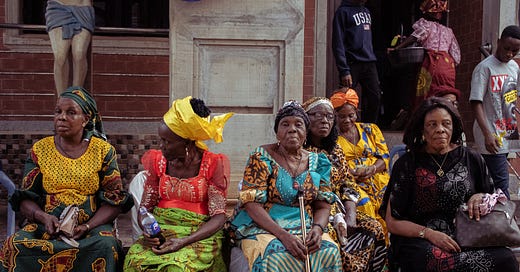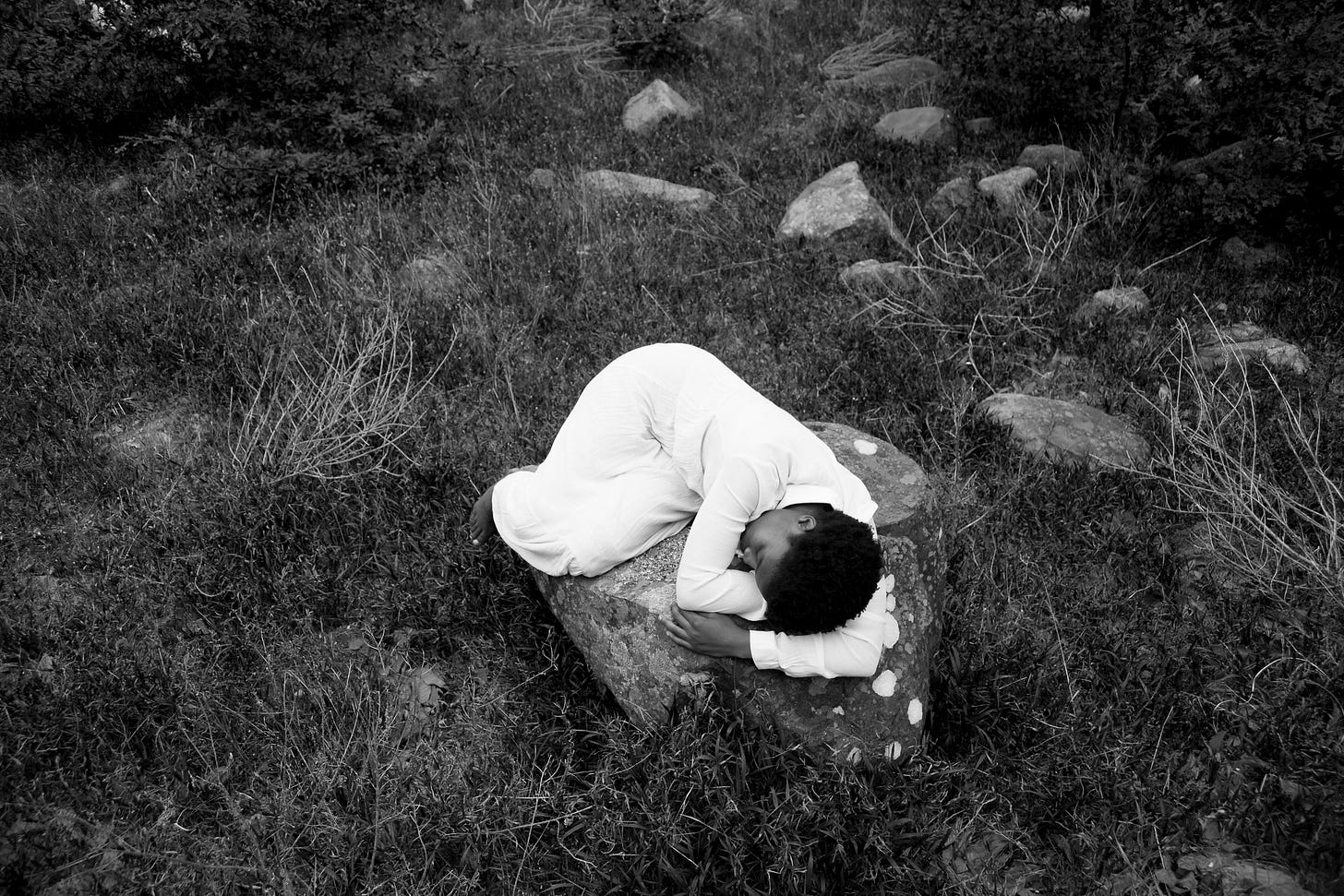The distribution in the photograph is uneven, such that more people appear on the right side of the frame than on the left. Shot in front of a building, the photo seems unposed. In the foreground are women of advanced age who sit with their hands on their lap. And with them are an assortment of items: a purse, a cola drink, a cane, a handkerchief, some naira notes, and a brown bag. Their gazes are turned in different directions, away from the camera. The woman in the centre is an exception. And her face bears the hint of a smile as subtle as the glimpse of the raised foot close to the doorway, which retreats into the dark.
— Zenas Ubere
“Photography is essential in preserving our history, telling our stories and gauging growth or stagnancy.”
This photo was taken in my village after my father’s 60th birthday mass in our Anambra home. The subjects of the photo are my paternal grandmother in the middle looking directly at me, flanked on both sides by my grand aunties. I think about this photo a lot – sad about how in the next 20 years or so these women would not be here, but also joyful because I immortalized them with this single photograph.
I recently began a project titled Archiving Igbo Joy and “Ndi Nne Ochie” is part of the project. This archival project seeks to celebrate the beauty and depth of Igbo culture and serves as a platform to critique aspects that require evolution. In particular, by capturing and highlighting the invaluable contributions and significance of women in Igbo traditions, I intend to spotlight and challenge the patriarchal system that has historically marginalized women and girls within Igbo societies.
I chose this photograph because it has unconsciously become a fusion of everything I hope to do with my work as an artist and documentary photographer: documenting women, documenting the mundane moments of the lives of the ordinary Igbo person, and archiving the Igbo culture.
Photography is essential in preserving our history, telling our stories and gauging growth or stagnancy. I will always be an advocate for documentation, whether it is of self or of others. There is a slow erasure of the way of life of the Igbo people due to globalization/westernization, migration, the declining economy, lack of preservation of important sites, history not being properly taught in schools, etc. That is why this year I will continue the process of documenting the customs, traditions, joys, history and shortcomings of the Igbo people.
— Amarachi Nnoli
About Amarachi Nnoli
Amarachi Nnoli (b. 2000, Enugu, Nigeria) is a photographer and photojournalist living and working in Lagos. Amarachi’s photography embodies a dual nature, blending conceptual and documentary styles, capturing both the imagination and reality of her subjects. Her work centres the conversation around the erasure and documentation of women in different fields within the structures of familial relationships. See more of her work on Instagram.
LAST WEEK — “Pass Me Over,” by Bongeka Ngcobo
It represents the exact feelings and emotions I was going through at the time. How would you feel when something you have been speculating for years has been confirmed to be true? What to do with the truth? It is said that the truth will set you free, but in my case it left me with so much hurt. I don’t believe I was ready to hear the truth, but I believe the truth narrator was set free.
This is the 104th edition of this publication, edited by Zenas Ubere, one of our editorial fellows. The newsletter also read on web (best for viewing images), and via the Substack iOS/Android apps.
TENDER PHOTO is a newsletter on African photography. Every Wednesday we feature a photograph and a short caption about it, and include a statement from the photographer. Every Friday, we publish commentaries or photo-essays in response to photographs previously featured on the newsletter. The most recent series is INDEX, and the next series will begin on February 16.
Our goal is to work with African photographers by creating a platform in which they lead the cataloguing and engagement with their work.
Thank you for reading. If this newsletter was shared with you, consider subscribing, or forward to a friend. Please whitelist the newsletter to ensure you never miss it.







Powerful. Both photography and your narrative. Wonderfully done.